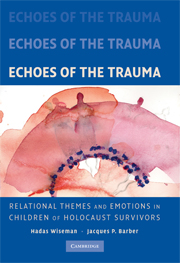Book contents
- Frontmatter
- Contents
- Foreword by Dan Bar-On
- Preface
- Acknowledgments
- 1 Introduction – A Narrative Approach to Bridging the Gap between Clinical Case Studies and Empirical Research on Children of Holocaust Survivors
- 2 Studying Relationship Narratives with the Core Conflictual Relationship Theme Method
- PART ONE RELATIONAL THEMES IN THE NARRATIVES
- PART TWO EMOTIONS IN THE NARRATIVES
- PART THREE HEALING TRAUMA IN THE CHAIN OF THE GENERATIONS
- Appendix
- References
- Index
PART THREE - HEALING TRAUMA IN THE CHAIN OF THE GENERATIONS
Published online by Cambridge University Press: 29 July 2009
- Frontmatter
- Contents
- Foreword by Dan Bar-On
- Preface
- Acknowledgments
- 1 Introduction – A Narrative Approach to Bridging the Gap between Clinical Case Studies and Empirical Research on Children of Holocaust Survivors
- 2 Studying Relationship Narratives with the Core Conflictual Relationship Theme Method
- PART ONE RELATIONAL THEMES IN THE NARRATIVES
- PART TWO EMOTIONS IN THE NARRATIVES
- PART THREE HEALING TRAUMA IN THE CHAIN OF THE GENERATIONS
- Appendix
- References
- Index
Summary
This part of the book examines the echoes of the survivors' trauma as it transforms down the generations from survivors' children to their own children and from the survivors themselves to these grandchildren. We focus on processes of healing in the chain of the generations as the “music of knowing–not knowing” goes through a process of “working through” in families of survivors within a wider changing sociocultural context. In Chapter 11 we present our analyses of narratives of sons and daughters of survivors regarding their relationship with their parents during adolescence in comparison to the narratives they tell depicting their own current relationship with their adolescent children. We examine the latter relationship through their eyes, as well as through the eyes of their adolescent children (the survivors' grandchildren). In light of the parenting our interviewees received from their survivor parents, they appear to aspire to develop a different parent–adolescent relationship with their own children. As we will show, the quest for corrective parenting centered especially around the themes of granting autonomy and keeping open lines of familial communication.
Processes of working-through in the lives of the adult children of survivors may involve corrective experiences that they undergo in their relational world or through various forms of psychotherapy. In Chapter 12 we conclude by considering the clinical implications of our insights into the echoes of trauma in relation to knowing–not knowing processes for working with patients raised in families that experienced extensive trauma.
- Type
- Chapter
- Information
- Echoes of the TraumaRelational Themes and Emotions in Children of Holocaust Survivors, pp. 187 - 188Publisher: Cambridge University PressPrint publication year: 2008



